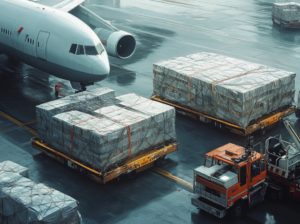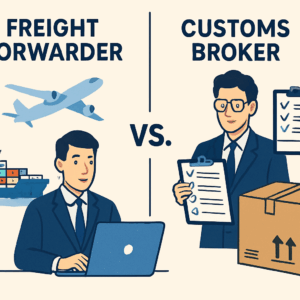Are you a small business owner looking to make your debut in the world of importing? Breaking into international trade can be incredibly rewarding, but it also comes with a steep learning curve. Navigating customs regulations, securing the right paperwork, and coordinating freight logistics can be overwhelming, especially for first-time importers. This is where a reliable customs broker can become your greatest ally.
In this ultimate guide, we will provide a detailed roadmap to help you understand the process of hiring a customs broker. From understanding their role to evaluating their credentials, this comprehensive resource is tailored to ensure your first import is a seamless and stress-free experience.
The Vital Role of a Customs Broker
A customs broker acts as the bridge between your business and customs authorities. Their primary responsibility is to streamline the customs clearance process for your imports by ensuring compliance with regulations and managing essential documentation.
Customs regulations vary by country and product type, making the process highly complex. A licensed customs broker uses their expertise to ensure:
- Correct classification of your goods under the Harmonized Tariff Schedule (HTS).
- Calculation and payment of duties and taxes.
- Filing of proper import documentation to prevent delays.
Real-Life Example: Why a Customs Broker Matters
Imagine importing electronic devices like smartphones. Items in this category often attract specific regulations, including safety certifications and additional duties. Without professional guidance, you may misclassify your products, leading to higher tariffs or penalties due to non-compliance.
A qualified customs broker ensures accuracy, saving both time and money – allowing you to focus on growing your business.
Step 1: Understanding Customs Broker Requirements
Before you begin your search, it’s crucial to understand the qualifications and skills your customs broker should have. Look out for:
What to Look for in a Licensed Customs Broker
- Customs Broker License: Ensure the broker holds an official government-issued license, such as those issued by U.S. Customs and Border Protection (CBP) in the United States.
- Experience in Your Product Category: Brokers specializing in your product niche are more likely to understand specific import regulations.
- Customs Broker Certification: Additional certifications, such as Certified Customs Specialist (CCS), signify advanced expertise.
- Strong Industry Relationships: A broker’s network with freight companies and customs authorities enhances their ability to expedite processes.
Red Flags to Watch Out For
- Outdated knowledge of customs regulations.
- Poor communication or lack of transparency in fee structures.
- Inability to provide references or customer testimonials.
By vetting these attributes upfront, you lay the foundation for a reliable partnership.
Step 2: The Import License Application and Document Requirements
One of the initial hurdles in the importing process is obtaining an import license. Not all goods require one, but it’s essential to determine if your product does before proceeding. A knowledgeable customs broker can guide you through this process.
Common Document Requirements for Imports
- Commercial Invoice: Lists products, value, and terms of sale between you and the exporter.
- Bill of Lading: Acts as proof of shipment ownership and transportation details.
- Packing List: Describes the quantity and packaging of the goods.
- Certificate of Origin (if applicable): Specifies from which country the goods are sourced.
- Import Permit (if required): For restricted goods such as pharmaceuticals or firearms.
Example Scenario: Importing Restricted Goods
Suppose you’re importing medical equipment. The FDA in the U.S. or equivalent agencies elsewhere would likely require a permit and compliance documentation. A licensed customs broker ensures these requirements are correctly met, eliminating potential roadblocks.
By handling this paperwork accurately and promptly, your broker ensures that goods aren’t held up at customs.
Step 3: Freight Shipping and Logistics Coordination
Smooth freight handling is critical to the success of any import operation. A customs broker’s role extends to managing logistics, ensuring that your goods reach their destination without unnecessary delays.
Key Areas Your Broker Should Assist With
- Freight Shipping Coordination: Arranging shipment with the most efficient carriers for your cargo type.
- Carrier Logistics Coordination: Overseeing carrier relations to ensure compliance with agreements.
- Freight Transport Organization: Selecting proper transportation modalities (air, sea, or land) based on your budget and time constraints.
- Cargo Carrier Management: Tracking your shipment in real-time to prevent unanticipated issues.
Practical Illustration: Overcoming Freight Challenges
Imagine a scenario where your shipment is delayed due to improper labeling. A customs broker experienced in freight logistics would preemptively catch such issues, working proactively to resolve them without disrupting your supply chain.
Additionally, brokers with established relationships with freight carriers can help secure competitive rates, lowering costs for your business.
Step 4: Evaluating Customer Experiences and Success Stories
When choosing a customs broker, their previous clients’ success stories can offer valuable insights. Do your due diligence by:
- Requesting case studies or references from past clients.
- Reading online reviews about their service quality and reliability.
- Connecting with industry peers to gather recommendations.
Example of Success: Case Study
A small wellness company importing essential oils faced challenges with import permits and compliance certifications. By hiring a reputable customs broker familiar with niche regulations, they successfully expedited customs clearance and reduced costs by 15%.
Learning from others’ experiences allows you to make informed decisions and avoid common pitfalls.
Step 5: Seek Transparency and Actionable Guidance
Clear communication and education from your customs broker are crucial. As a small business owner, understanding at least the basics of the import process will empower you to make thoughtful decisions. Choose a broker who excels at offering guidance and explaining their procedures.
Tips for Spotting a Transparent Broker
- Offers a comprehensive welcome package explaining processes and fees upfront.
- Provides a written contract to avoid hidden charges.
- Tackles your questions with clarity and patience.
Practical Advice: How-to Guides Are Valuable
Some brokers offer simplified how-to guides for their clients, explaining key aspects like customs clearance and duty payment in layperson’s terms. These guides are a sign of a broker who genuinely wants to make your importing journey as smooth as possible.
The Costs of Hiring a Customs Broker
Understanding the cost structure of hiring a customs broker is an essential step in budgeting for your import process. While fees vary depending on the broker and import volume, here’s a general idea of common charges:
- Flat fees for customs clearance (ranges between $50 to $250 depending on complexity).
- Processing fees for filing documents like the Importer Security Filing (ISF).
- Duties and taxes charged by customs authorities, which brokers often facilitate on your behalf.
- Storage fees in case of shipment delays at warehousing facilities or ports.
Verify if the broker offers bundled packages for small business importers, which can make costs more predictable.
Final Thoughts
Hiring a customs broker is not just a functional decision; it’s a strategic one. Partnering with a licensed professional will smooth out the intricacies of international trade, enabling your business to thrive in a global marketplace.
From navigating critical license applications to mastering freight logistics, the right customs broker ensures your first import feels manageable. Investing time into selecting the right partner helps prevent costly mistakes and sets a foundation for long-term success in importing.
Take the first step today by researching licensed customs brokers in your industry niche. A brighter, more streamlined future for your import business awaits!
Happy importing!




